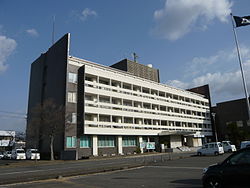|
Gobō, Wakayama
 Gobō (御坊市, Gobō-shi) is a city located in Wakayama Prefecture, Japan. As of May 2024[update], the city had an estimated population of 21,260 in 10,801 households and a population density of 480 persons per km2.[1] The total area of the city is 43.91 square kilometres (16.95 sq mi). GeographyGobō is located at the mouth of the Hidakagawa River, almost in the center of the coastline of Wakayama Prefecture. The terrain is long from north to south, and the part facing the Kii Channel is almost flat, but the east side of the city is mountainous. Due to the influence of the Kuroshio Current, the city enjoys a mild climate. Neighboring municipalitiesWakayama Prefecture ClimateGobō has a Humid subtropical climate (Köppen Cfa) characterized by warm summers and cool winters with light to no snowfall. The average annual temperature in Gobō is 15.9 °C. The average annual rainfall is 1878 mm with September as the wettest month. The temperatures are highest on average in August, at around 26.1 °C, and lowest in January, at around 6.1 °C.[2] The area is subject to typhoons in summer. DemographicsPer Japanese census data,[3] the population of Gobō has been declining steadily over the past 40 years.
HistoryThe area of the modern city of Gobō was within ancient Kii Province. The village of Gobō was established with the creation of the modern municipalities system on April 1, 1889. It took its name from a branch temple of Nishi Hongan-ji, the Hidaka-Gobō, which had been built at this location in 1528, and which was known locally as "Gobō-sama". The village was raised to town status on February 1, 1897. Gobō merged with the villages of Fujita, Noguchi, Nada and Shioya to form the city of Gobō on April 1, 1954. GovernmentGobō has a mayor-council form of government with a directly elected mayor and a unicameral city council of 14 members. Gobō contributes one member to the Wakayama Prefectural Assembly. In terms of national politics, the city is part of Wakayama 3rd district of the lower house of the Diet of Japan. EconomyIn ancient times, Gobō developed as a distribution center for timber transported by the Hidaka River and as a fishing port. Commercial fishing, especially for horse mackerel, abalone and spiny lobster remains important, as does agriculture, especially the production of cut flowers. Gobō's slogan is "Hanamaru Gobō", linking the city with flowers. The city's greenhouses produce a wide range of blooms, supplying the Japanese market, and its official flower is the Hibiscus hamabo, a kind of hollyhock growing up to 3 to 5 metres (9.8 to 16.4 ft) in height, and bearing yellow flowers in the summer. The hibiscus are found at the mouth of the Hidaka River with its warmer microclimate. In terms of industry, Hidaka Port corporate site and Gobo Industrial Park in the Shioya district in the southern part of the city, forming the industrial area. This includes the production of mahjong tiles by Taiyo Kagaku, which has a near monopoly on the Japanese domestic market. The Kansai Electric Gobō Thermal Power Plant is located in Gobō. EducationGobō has six public elementary schools and four public middle schools operated by the city government and four public high schools operated by the Wakayama Prefectural Department of Education. The city also has one private/middle school. The prefecture also operates one vocational education school. TransportationRailway
HighwayLocal attractionsGobō has "Gobō Synthesis Sport Park". This park has a baseball ground and multipurpose ground, training place and more. It is a popular relaxation spot among the locals. Notable people
References
External links
|
|||||||||||||||||||||||||||||||||||||||||||||||||||||||||||||||||||||||||||
Portal di Ensiklopedia Dunia




